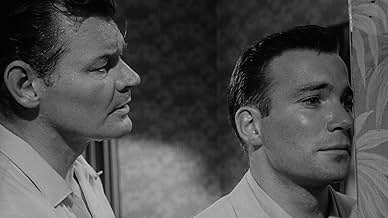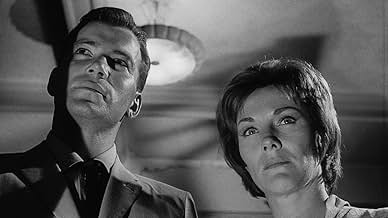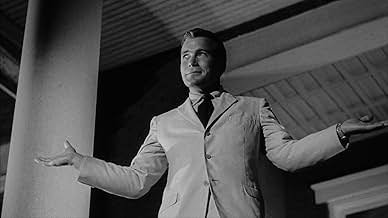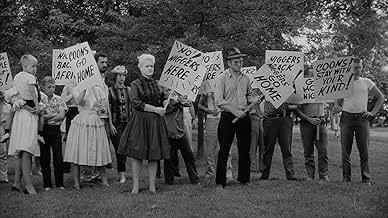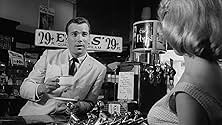Um homem em um terno branco reluzente chega a uma pequena cidade do sul na véspera da integração. Ele se autodenomina um reformador social. Mas o que ele faz é criar problemas - problemas qu... Ler tudoUm homem em um terno branco reluzente chega a uma pequena cidade do sul na véspera da integração. Ele se autodenomina um reformador social. Mas o que ele faz é criar problemas - problemas que ele logo descobre que não consegue controlar.Um homem em um terno branco reluzente chega a uma pequena cidade do sul na véspera da integração. Ele se autodenomina um reformador social. Mas o que ele faz é criar problemas - problemas que ele logo descobre que não consegue controlar.
- Bart Carey
- (as William Nolan)
- Jack Allardyce
- (as O.C. Ritch)
- Old Hotel Clerk
- (narração)
- (não confirmado)
- Billy Lee
- (não creditado)
Avaliações em destaque
What you are not being told is the history behind this movie. It has been released and released under many names including it's original name "I Hate Your Guts" and then "Shame". The reason for this is because the movie is so realistic, it is taboo and is disturbing.
Please note: It's not gory disturbing, it's people disturbing; you can actually believe that a small community of individuals will react as this community does to the suggestions of an outsider, William Shatner.
And the performance from Shatner, my lord!, you will not believe it's William Shatner!
If you are a film buff, buy the DVD, don't even bother renting. The VHS went Out Of Print Quickly, I am not going to miss owning this on DVD. Great viewing!
Corman indulged in a form of guerilla film-making to make a statement that he felt needed to be made. Corman, the cast and the crew were thrown out of two locations, worked under constant threat of physical violence, and wrapped this lean, tight, morality play in a grand total of three weeks. Most of the cast had literally NO acting experience. Does it show? Occasionally - but in the end the odd representations of some of the extras in the mob only adds to the film's realism.
The Intruder is a story which examines the ease with which a charismatic leader with a pernicious all-consuming hunger for power can exploit fear to rally otherwise normal people into irrationality, violence and hatred. William Shatner stars as Adam Cramer, a northern hate-monger who has just arrived in the small southern town of Caxton to sow the seeds of racial violence just as the town has begun to integrate its schools in compliance with federal law. Cramer preaches non-violent resistance, but is unwilling to stand in the way when his followers escalate the issue in their own way. His powerful and dramatic speaking ability and his cunning turn most of the town's white minority against their black neighbors, culminating in his orchestration of a vicious frame-up of an innocent student.
Cramer is, in one way or another, behind almost everything that happens in this film. Yet the film does not permit facile scape-goating of this single sociopath. Rather, it indicts ignorance in general, and racism, hatred and intolerance much more specifically. Amazingly, it does so without exploiting stereotypes of southerners, yankees, blacks, whites, or anybody else. The Intruder deals with its subjects without reducing them to anything that could be wholly represented or analyzed in the hour and half of intense drama the film gives us. Instead, the Intruder leaves its subjects wide-open and raw. If you view this film about once every 6 months, you might just take something different away from it each time.
I do not believe the rumor that Roger Corman has ever, in any way, suggested that William Shatner's performance destroyed this film's box office potential. In interviews, Corman has consistently given Shatner a great deal of praise for his award-winning portrayal of evil incarnate. And rightly so. Shatner is nothing short of incredible in this film. He clearly dedicated everything he had to this film, and it shows. Other noteworthy performances are given by Frank Maxwell, Robert Emhardt and Charles Barnes.
The film is pristinely directed - lean and economically edited, even for Corman. The cinematography is straightforward and clean. And the locations are entirely appropriate - another Corman trademark.
Possibly the best truly low-budget film I have ever seen. Would-be film-makers, even some established big-budget purveyors of modern junk-food-film should learn a great deal from a careful study of the Intruder.
Extremely bold and brutally honest portrayal of race relations in the South in the early 60's when the film was made. By viewing it I can see it must have been way too inflammatory for its time. Yet, some parts of this flim made me kind of tense/uncomfortable. Therefore, I don't see it getting wide acceptance in today's politically correct world either.
Despite this, the film's theme and moral messages are ageless. The script is so intelligently written coupled with Shatner's convincing performance, I was not given impression that this is considered a "B" movie. OK, well maybe there are a few scenes that may indicate that but they are outnumbered by the compelling drama throughout the film. The final 5 to 10 minutes are particularly tense which may actually be hard to watch.
A commendable effort, I had no regrets in plucking down a few bucks to buy this flick.
This is Corman's most painstakingly worked-out film, which is why it is so powerful, suggesting, like Lang, a set of mathematical propositions that seem simple but, add up to a theorem that seems to negate mathematical principles of logic, order etc. As in a Lang film, there is no 'hero' to root for - the lead here is a sinister right-winger linked to the KKK who arrives in an archetypal Southern town to stir up race hatred. He is given the conventional Hollywood hero treatment: the opening credits set up his point of view, establishing his way of looking at the world.
But even over these credits, Corman confuses us. At first we think he's a solitary figure, it is him alone we see entering the town and looking at it. Then he comes out with a woman and child, and we assume he's a family man, but that turns out to be wrong too. So, in these opening scenes we are presented with a lead character in the conventional manner, but, unconventionally, we are unable to get a grip on him.
Similarly, in spite of the title and the menacing opening music, Cramer's good manners and charm continue to suggest him as a hero, even though he is trying to stir up racist feeling, especially when compared to the next significant male character, a loud braggart who appears to be raping his nymphomaniac wife. In this first third, there are no sides drawn, we might almost be watching a racist film, such is Cramer's conventional heroic status. He even seems a movie star, with his dark shades and good looks, which Corman plays on ironically in the scenes of demagogary and when his 'fans' protest his jailing.
Like Lang, Corman switches point of view disturbingly and decisively. This opening out of point of view makes clear the issues, and in a way that conventional Hollywood cinema of the time could not conceive. The reason films like this were considered 'B' or exploitation is because they were telling truths that official Hollywood didn't even know existed. How many contemporary Hollywood films were even dealing with these issues, never mind as provocatively and intelligently as this one? When they finally got round to it, it was cosy liberal kramergloop.
There is no flip solution here - the moral centre is a moderate racist who is nearly killed for his growing ethical awareness (the newspaper editor) - other liberals are shown to be almost criminally useless. Corman asks questions with no easy answers - how do you enforce progressive laws? how do you hold back a mob without becoming as reactionary as them? Cramer, influenced by Lenin as much as Hitler, makes his appeals to democracy and freedom, and Corman forces us to admit that he is right, to reconsider what we mean by these concepts. This is a stunning film, full of tense calm giving onto explosions of harrowing violence, with an insight into its roots in sexual neurosis, including a sequence where the KKK come into town like an invading army, a huge cross like a tank turret, ready to be burned; a lynch sequence as shocking as Huck Finn or 'The Ox-bow Incident'.
Along with the unusual, Langian clarity of the monochrome imagery, note the grids on or around Cramer - crossed telegraph wires, the bars of the hotel lobby etc. - culminating in the demand for the accursed rapist behind a grilled window, like a frothing beast; or the childlike immaturity of the racists, whose hatred centres around the school's swing. The frightening 'speech' scene, outside a monumental civic building, in Nuremberg-like lighting, is more potent than anything in 'All the King's Men'.
Enter Adam Cramer (Shatner), a representative from Washington of the Patrick Henry Society. He claims to be a social worker, but it turns out that this society is a racist organization opposed to desegregation. Cramer hopes to interfere with the court-ordered policy and begins to stir up the community with fiery rhetoric and bold tactics. Cramer soon discovers that the mob he has helped create is beyond is ability to control.
"The Intruder" is a little known film written by Charles Beaumont (a core writer for "The Twilight Zone" and a screenwriter for many of American International's classic 1960s horror films) and directed by Roger Corman. It shouldn't be little known. This is arguably the best and most important film ever made by Corman and perhaps by Beaumont as well. Shatner puts in a sterling performance as the racist Cramer and the supporting cast, which included both veteran actors and local citizens from the town of Charleston, Missouri (where it was filmed), is also excellent. Corman and Beaumont took on some seriously volatile subject matter and used both tact and intelligence to tell a story and send a message. For those who are more sensitive to racist language or who are caught up with political correctness, "The Intruder" might be somewhat abrasive or uncomfortable to watch. Personally, I think that this would be ideal for viewing in high schools and colleges that are studying the subject of racism and integration in the United States. Regardless, for those seeking a well made, well acted film
Você sabia?
- CuriosidadesAfter the crew was thrown out of East Prairie, MO, by the chief of police (for allegedly being "communists"), Roger Corman realized that he needed one more wide shot of the high school. He and an assistant went back into the town and hurriedly filmed the shot. The chief must have gotten wind of his being there, as he was seen by Corman arriving in the distance. Corman and his assistant quickly threw the camera and equipment into their car, and sped away in the opposite direction, unscathed.
- Erros de gravaçãoAt the beginning of Adam Cramer's speech in front of the town hall, he unbuttons his jacket twice.
- Citações
[last lines]
Sam Griffin: [to Adam Cramer] Boy, you're gonna get grass stains all over those trousers you don't get up. Come on. That's better. I figure your work in this town's about over. If you hurry, you can catch the bus to Farragut. They got trains there. If you're a little light on travelin' money, I'd be proud to... You're sure, now? Oh, I almost forgot. These belong to you. I wouldn't wanna steal from you, boy.
- ConexõesFeatured in Some Nudity Required (1998)
Principais escolhas
- How long is The Intruder?Fornecido pela Alexa
Detalhes
Bilheteria
- Orçamento
- US$ 90.000 (estimativa)
- Tempo de duração1 hora 24 minutos
- Cor
- Mixagem de som
- Proporção
- 1.85 : 1
Contribua para esta página



